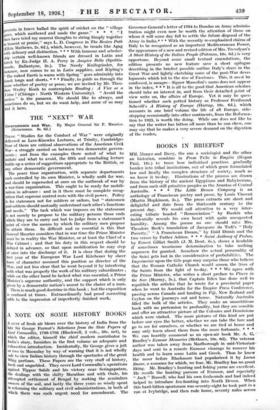A NOTE ON SOME HISTORY BOOKS
A OUST of fresh air blows over the history of India from the late Sir George Forrest's Selections from the State Papers of Lord Cornwallis, 1786-1793 (Blackwell, 2 vols., 36s. net), to which the editor, himself the chief modern contributor to India's story, furnishes in the first volume an adequate and exhaustive introduction.- Incidentally, Sir George gives a jolt or two to' Macaulay by way- of warning that it is not wholly safe to view Indian history through the spectacles of th6 great Whig partisan. These Papers are the very--stuff of history, fresh and ungarbled. They cover Lord Cornwallis's operations against Tippoo Sahib and his victory near Seringapatam, the dealings with the shifty Marathas and with Oude, his attempted settlement of Bengal by making the zemindars owners of the soil, and lastly the three years so wisely spent in reforming the military and civil administrations, in both of which there was such urgent need for amendment. The Governor-General's letter of 1794 to Dundas on Army adminis- tration might even now be worth the attention of those on whom it will some day fall to settle the future disposal of the Army in India.* * * With the recently re-emphasized claims of Italy to be recognized as an important Mediterranean Power, the appearance of a 'new and revised edition of Mrs. Trevelyan's A Short History of the Italian People (Putnam, 10s. 6d.) is very .opportune. Beyond some small textual emendations, the edition presents no new feature save a short epilogue describing in the briefest possible outline Italy's share in the Great War and lightly sketching some of the post-War deve- lopments which led to the rise of Fascismo. This, it must be confessed, is meagre—Signor Mussolini's name does not appear in the index. * * * It is all to the good that American scholars should take an interest in, and from their detached point of view write on, the affairs of Europe. Yet it may be ques- tioned whether such potted history as Professor Ferdinand Schevill's A History of Europe (Harrap, 10s. 6d.), which recounts in one brief voltime the life of all Europe, side- stepping occasionally into other continents, from the Reforma- tion to 1925, is worth the doing. While one does not like to say that the writer has bitten off more than he can chew, one may say that he makes a very severe demand on the digestion of the reader.






























































 Previous page
Previous page